Authentic Pesto Genovese (Basil Pesto)
Aug 27, 2021, Updated Jul 20, 2024
This post may contain affiliate links. Please read our disclosure policy.
Authentic Italian Pesto Genovese (Basil pesto) is a simple, fresh sauce that makes a delicious pasta sauce, condiment, or dip.
Try a twist on this classic: Arugula Walnut Pesto or Pistachio Pesto. 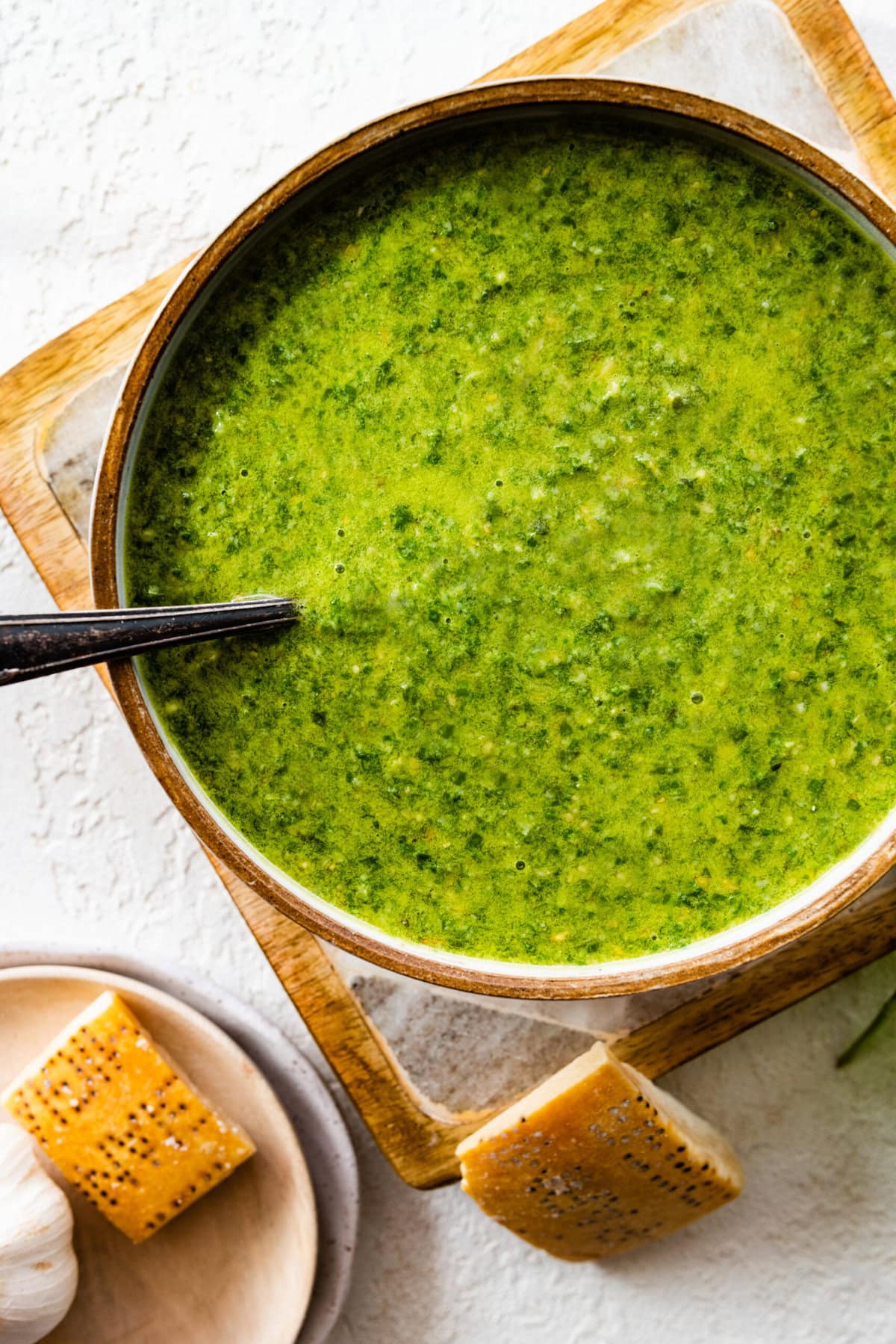
Pesto! Pesto! Presto! Let’s make easy and authentic pesto, presto (soon)! This is our family’s authentic pesto recipe. As soon as all the ingredients come together, the smell is captivating and, for me, nostalgic. I could eat this by the spoonful!
I love pesto alla genovese (Italian basil pesto) on warm fresh bread, hot pasta, sauce for green beans, or on top of vine ripe summer tomatoes and fresh mozzarella.
Authentic Italian style pesto is a thick, green sauce that tastes bright and herby from the basil, and salty and rich from the cheeses and pine nuts.
It should be garlicky (but not too much garlic to overpower the fresh basil), with a pleasant fresh taste from a good quality olive oil.
Homemade pesto is one of our family favorites! If you have loads of basil from your fresh basil plants, you need this simple recipe!
Simple Ingredients
Simple ingredients for an easy sauce.
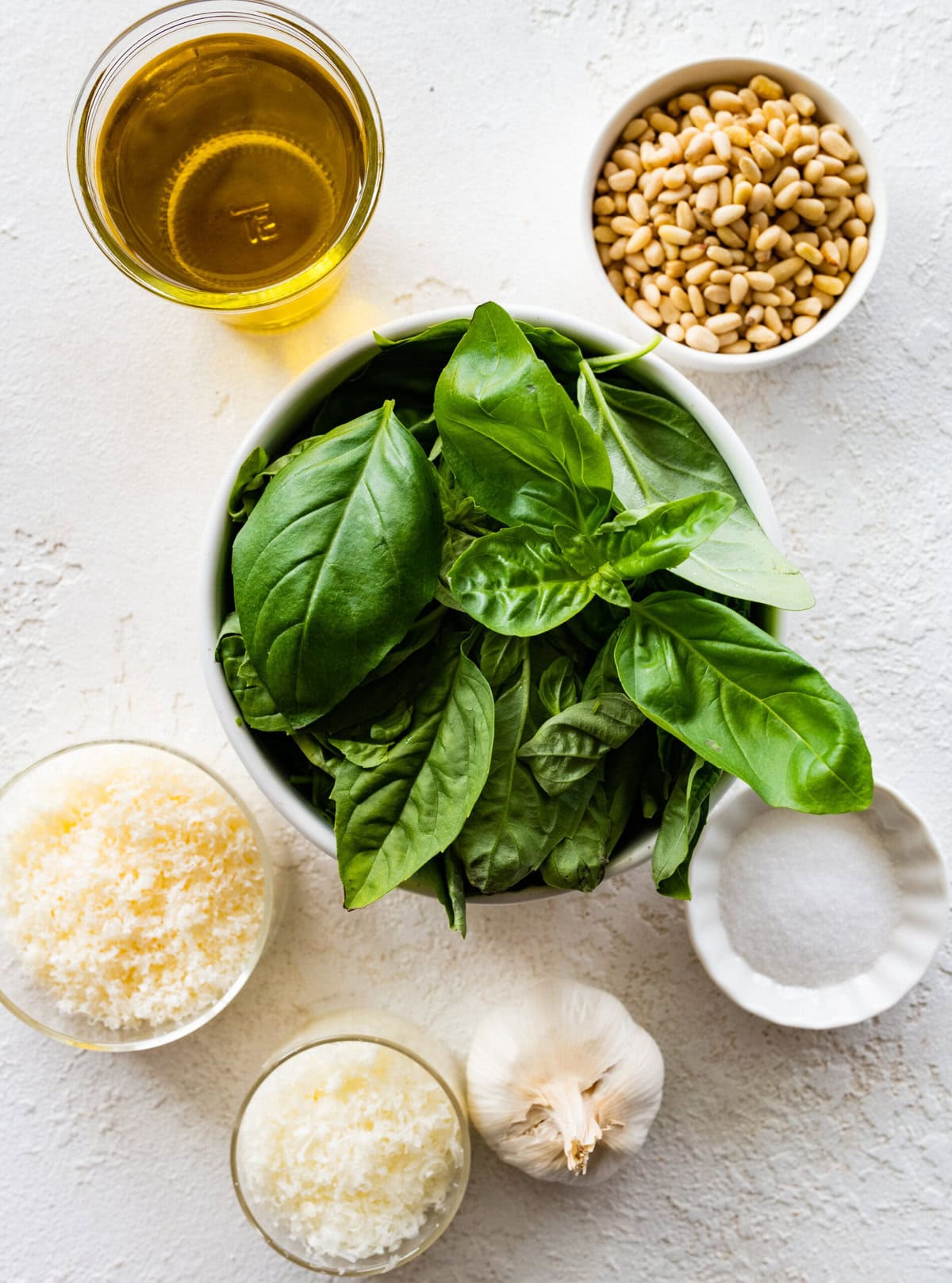
- Fresh basil leaves
- Extra virgin olive oil
- Garlic
- Pine nuts
- Parmigiano Reggiano cheese (fiore sardo- if you can find it)
- Pecorino cheese (pecorino romano or pecorino sardo)
- Sea salt
Quantities in recipe card.
How to Make Pesto Genovese
To make pesto the traditional way using a marble mortar and wooden pestle.
- Crush the garlic cloves using a mortar and pestle. Add the pine nuts and crush with the garlic. Gradually add the basil leaves, making a circular motion with the pestle, until a smooth paste forms. You can make it a little coarser if you prefer.
- Using a wooden spoon, mix in the freshly grated Parmigiano-Reggiano and pecorino Romano cheeses. Stir in the olive oil until the pesto is blended.
To save time, I use a blender or food processor to make my pesto. It is easy, and I find that more people have blenders than a mortar and pestle. Do as you please and what you have at home! The more important part is the right ratios and simple ingredients!
Blender Method
Making pesto in a blender is easy!
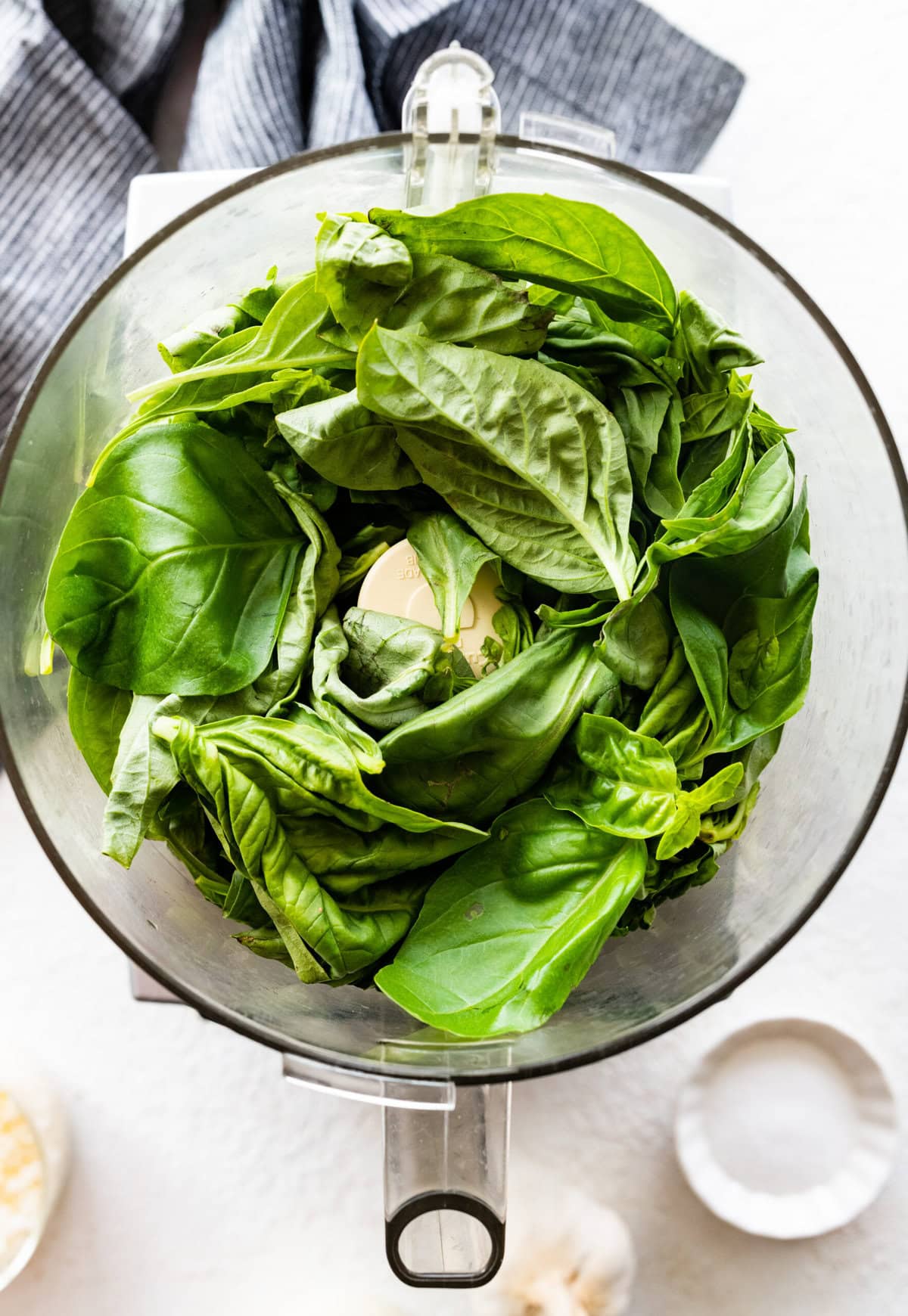
TOP TIP: Freeze the blade! A trick to avoid the risk of the heat produced by the food processor spoiling the pesto flavor is best to put the removable parts of the processor or the blender in the freezer for 20 minutes before using it.
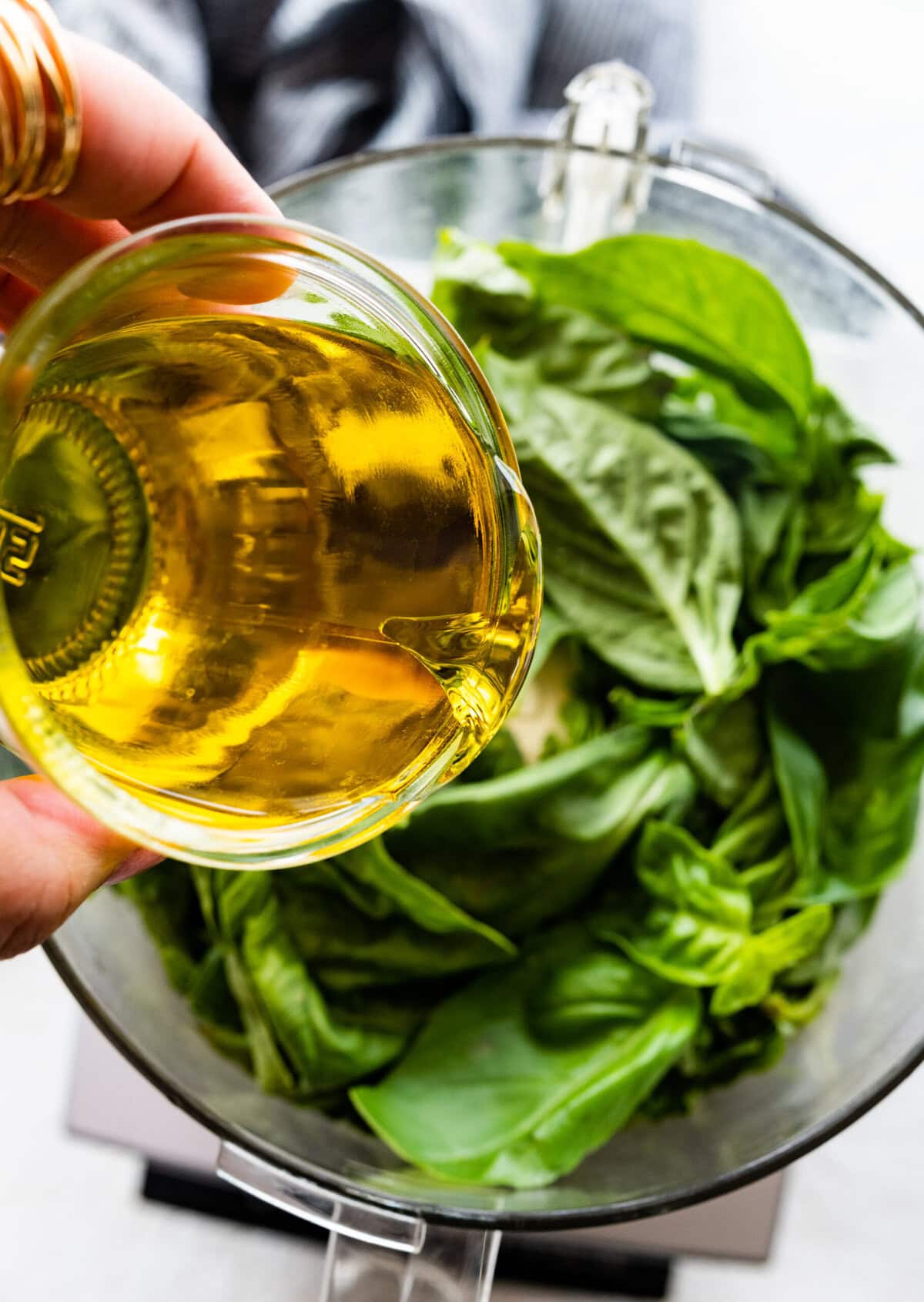
Place all ingredients at the same time (except pine nuts and parmigiano). In order to reduce the amount of time, the leaves are in contact with the blades (causing browning and spoiling flavor).
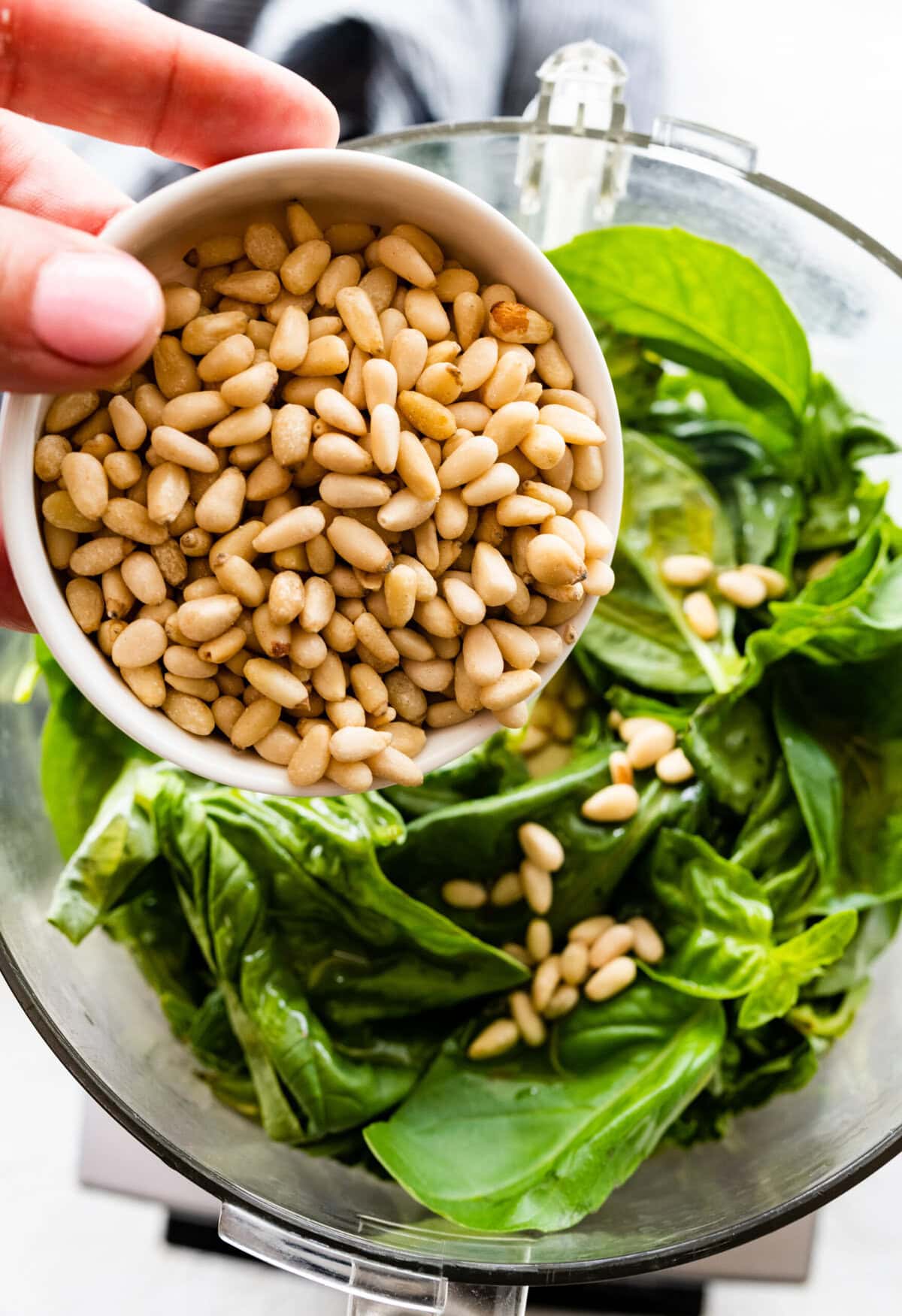
Pulse at the maximum speed; if you work fast, you’ll get a great pesto.
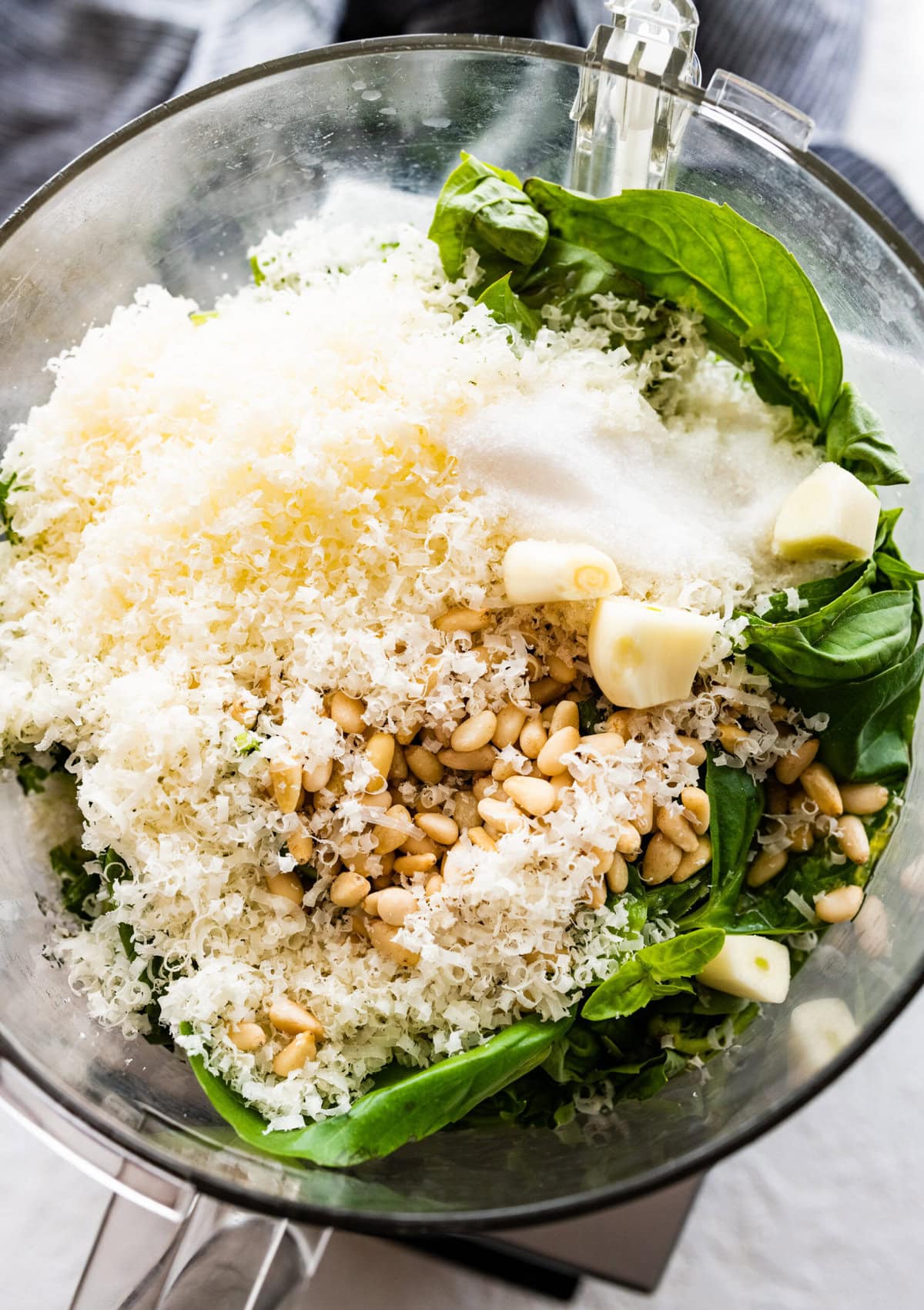
It’s helpful to stop the processor three or four times to scrape the pesto from the sides with a spatula.
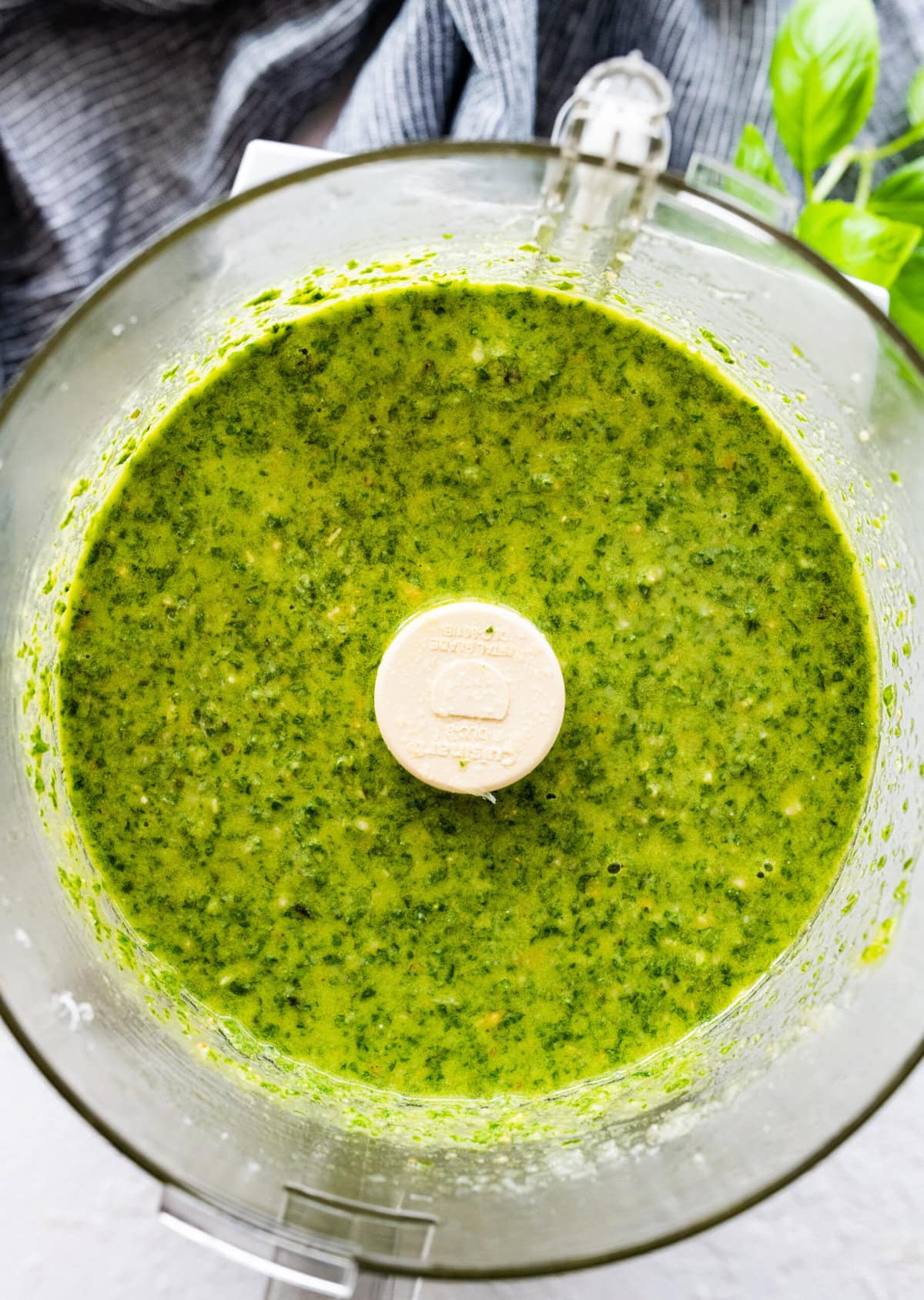
Storage
How long does Pesto last in the fridge?
Store pesto in jars or airtight containers or sealed glass jars in the refrigerator for about one week.
I add a final layer of olive oil to seal the top and act as a natural sealer before putting a secure lid on top.
You can use this recipe to make our Easy Pesto Pasta Recipe!
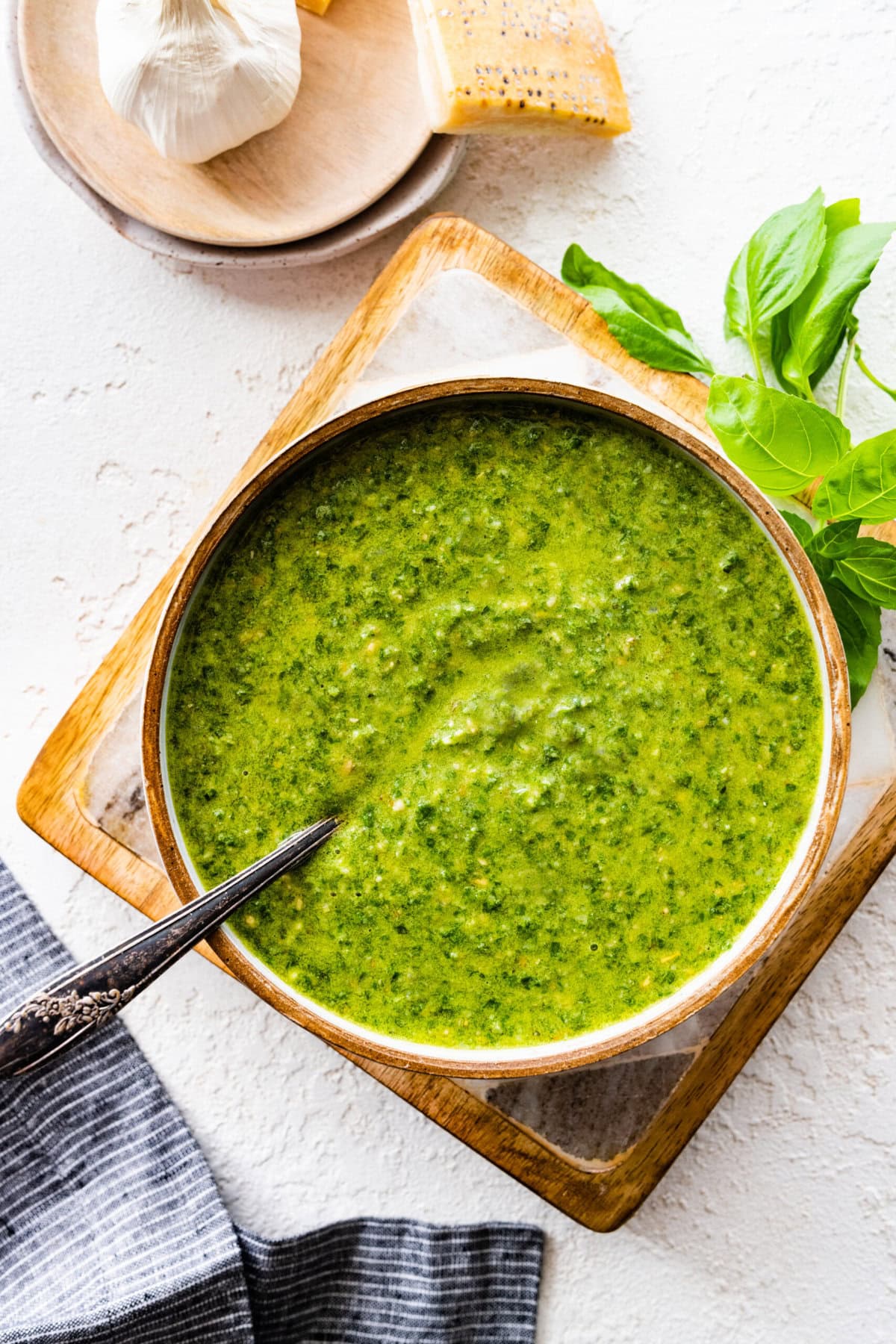
Can you Freeze Pesto?
Yes! You can freeze homemade pesto. I like to freeze them in an ice tray. Start by placing pesto in clean ice cube tray containers and freezing them.
After a couple of hours, the pesto cubes will be frozen, pop them out and store them in a freezer-safe bag. You can keep the cubes in the freezer for up to 6 months. Pesto may also be frozen in small jars or plastic containers for up to 9-12 months.
History of Pesto Genovese
Pesto is a sauce originating in Genoa, which is located in the northern region of Italy. It originated around the 16th century and traditionally consists of crushed garlic, basil, and pine nuts blended with Parmigiano or parmesean cheese and olive oil.
The Italian word pesto: pestare, means to pound, or to crush. Pesto was originally prepared with a marble mortar and wooden pestle.
The ingredients were not exactly pounded or crushed, but they were incorporated by making a circular motion using the pestle in the mortar. Now, you can make pesto in many different ways using other tools, such as a blender.
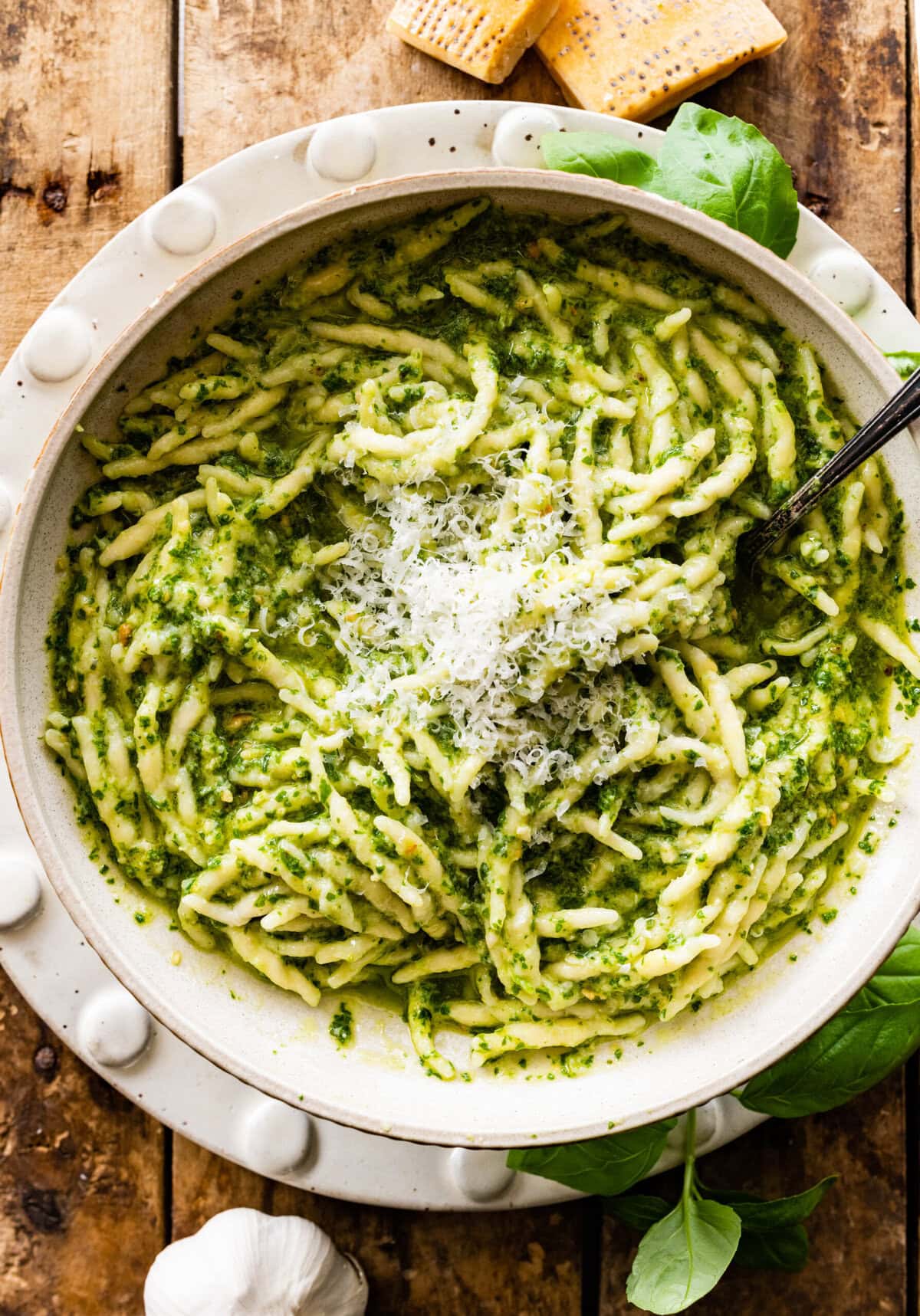
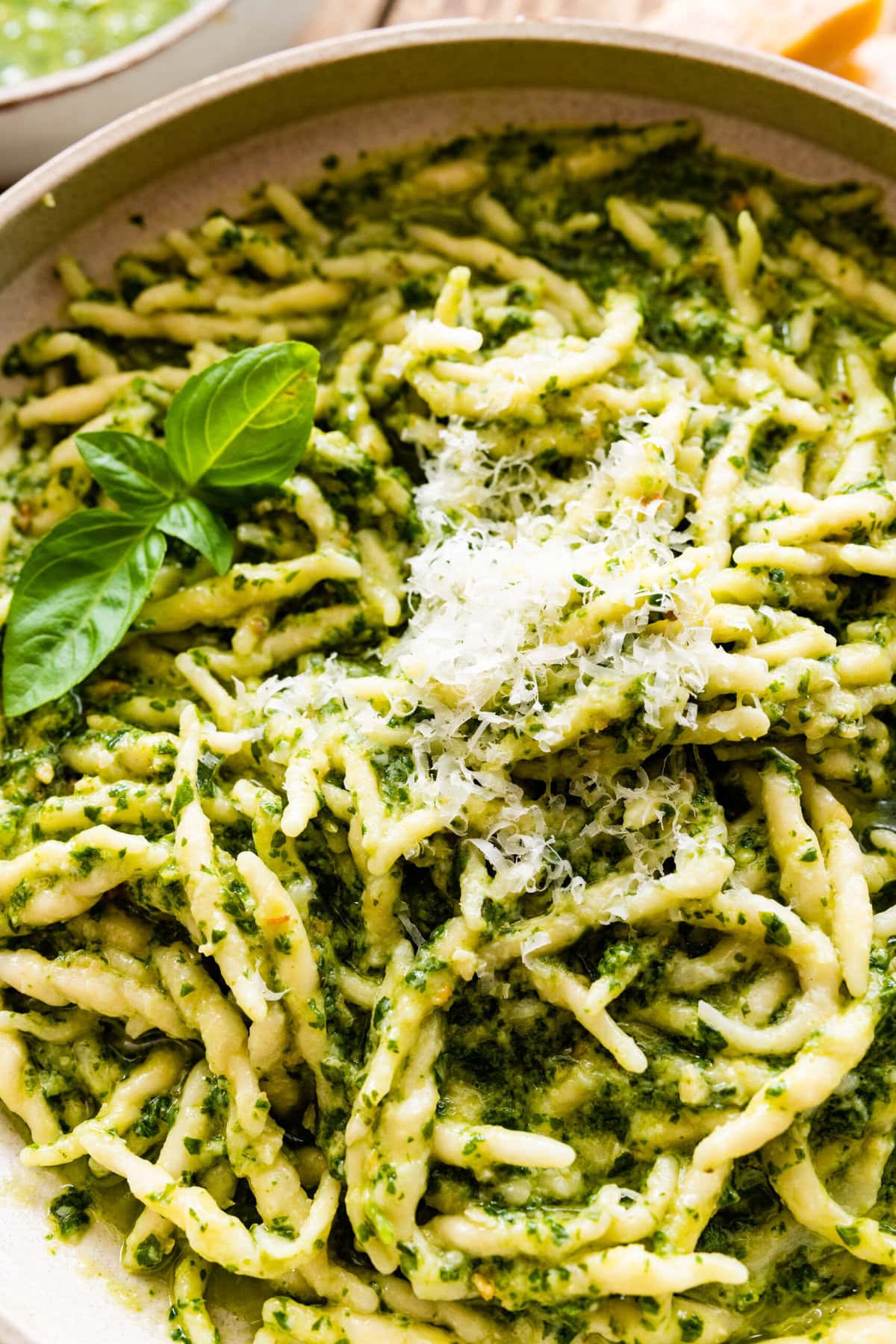
Serving Suggestion for Basil Pesto
Serve pesto with vine-ripe tomatoes and fresh mozzarella cheese. It will look like the Italian flag on a plate! It’s also great on sandwiches, panini and so much more!

From my Cucina to Your Table. Mangia! (Eat!)
More Recipes
- Baked Zucchini and Tomatoes Bruschetta
- Italian Stuffed Zucchini (Twice Baked Zucchini)
- Sautéed Zucchini and Onion (Italian Recipe)
- Paccheri Pasta with Zucchini, Fresh Tomatoes, and Creme Fraiche
- Italian Style Pasta Salad Recipe (with Arugula)
- Penne Pasta and Peas Recipe with Mascarpone
- Smoked Salmon, Mascarpone, and Petite Pea Pasta
- One Pot Pasta Recipe- Asparagus Ricotta Lemon
- Orzo Pasta with Shrimp, Sun-dried Tomatoes, and Artichokes
FAQ’s
This easy Italian basil pesto Genovese sauce will last up to 5 days in the refrigerator if stored in an airtight container. The shelf life will be extended if you use the olive oil method shared above. See the full recipe post for freezing instructions.
Pesto should not be “cooked” or “baked.” Cooking pesto Sauce changes the makeup of the fresh basil and cheese, turning it darker in color. It is best at room temperature. If it needs to be thinned out, add a little warm water—even better—pasta water when making pesto pasta.
Yes! After incorporating all your ingredients, you can freeze pesto, even with the cheese, nuts, and garlic. Freezing pesto is really simple; it is just like making some ice cubes. It will last up to 3 months in an airtight container.
The most delicious and authentic Pesto Genovese recipe. If you make it and love it don’t forget to leave a review and star rating. I love to connect with all of you!
Print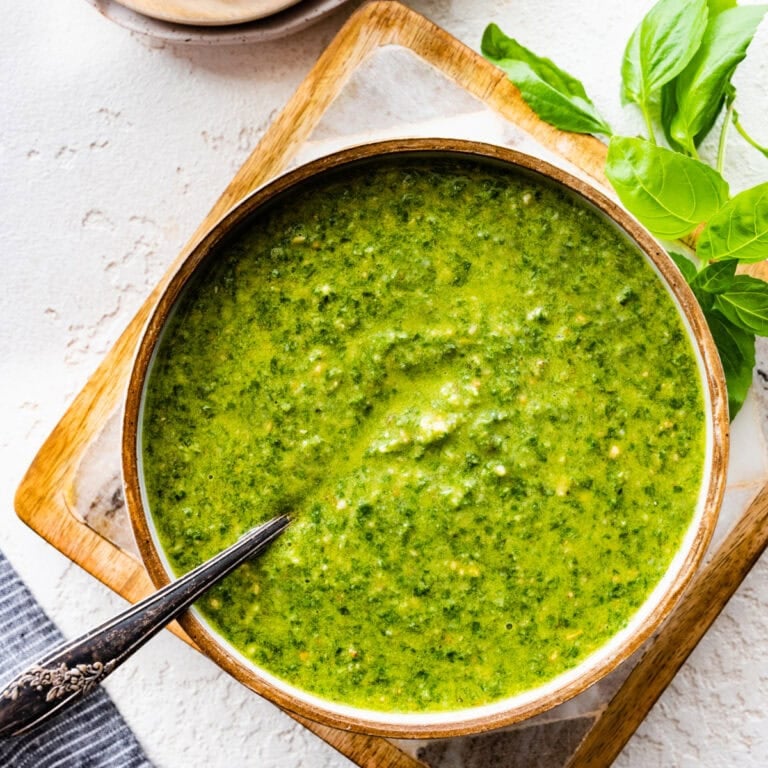
Pesto Genovese
Homemade pesto is a gloriously simple, fresh, and makes a superb pasta sauce, condiment, and dip.
- Total Time: 10 minutes
- Yield: 12 servings 1x
Ingredients
- 4 tablespoons pine nuts
- 1 teaspoon sea salt
- 2 garlic cloves, peeled and quartered
- 4 packed cups sweet Italian basil, leaves picked, thick stems removed
- 1/2 cup good quality extra virgin olive oil (add as needed if consistency is too thick)
- 1/2 cup Parmigiano-Reggiano, (Parmesan cheese), grated
- 1/4 cup Pecorino Romano, grated
Instructions
- Combine all ingredients in food processor, Vitamix, or blender* and blend until coarsely combined or smooth depending on preference.
- I like to add the pine nuts last so I can control how course I want the pesto. I generally prefer smooth pesto, but chunky/more coarse is great too. Stop 3-4 times to scrape sides with spatula.
- Transfer to small glass bowl with a lid or canning jar. Top with 1/2 inch olive oil and chill. The olive oil on top prevents browning of basil when it stays stored in the fridge.
- Enjoy with pasta*, on sandwiches, or as a dip!
Notes
*Instruction Tip: A trick to avoid the risk of the heat produced by the food processor spoiling the pesto flavor is best to put the removable parts of the processor or the blender in the freezer for 20 minutes before using it.
Also, in order to reduce the amount of time the leaves are in contact with the blades (causing browning and spoiling flavor) put all your ingredients in the food processor at once using the maximum speed; if you work fast, you’ll get a great pesto.
It’s helpful to stop the processor three or four times to scrape the pesto from the sides with a spatula.
**Serving Tip: To serve with pasta, combine with a few tablespoons of pasta cooking water so it will coat the pasta evenly.
- Prep Time: 10 min
- Category: Savory
- Method: Italian
- Cuisine: Italian
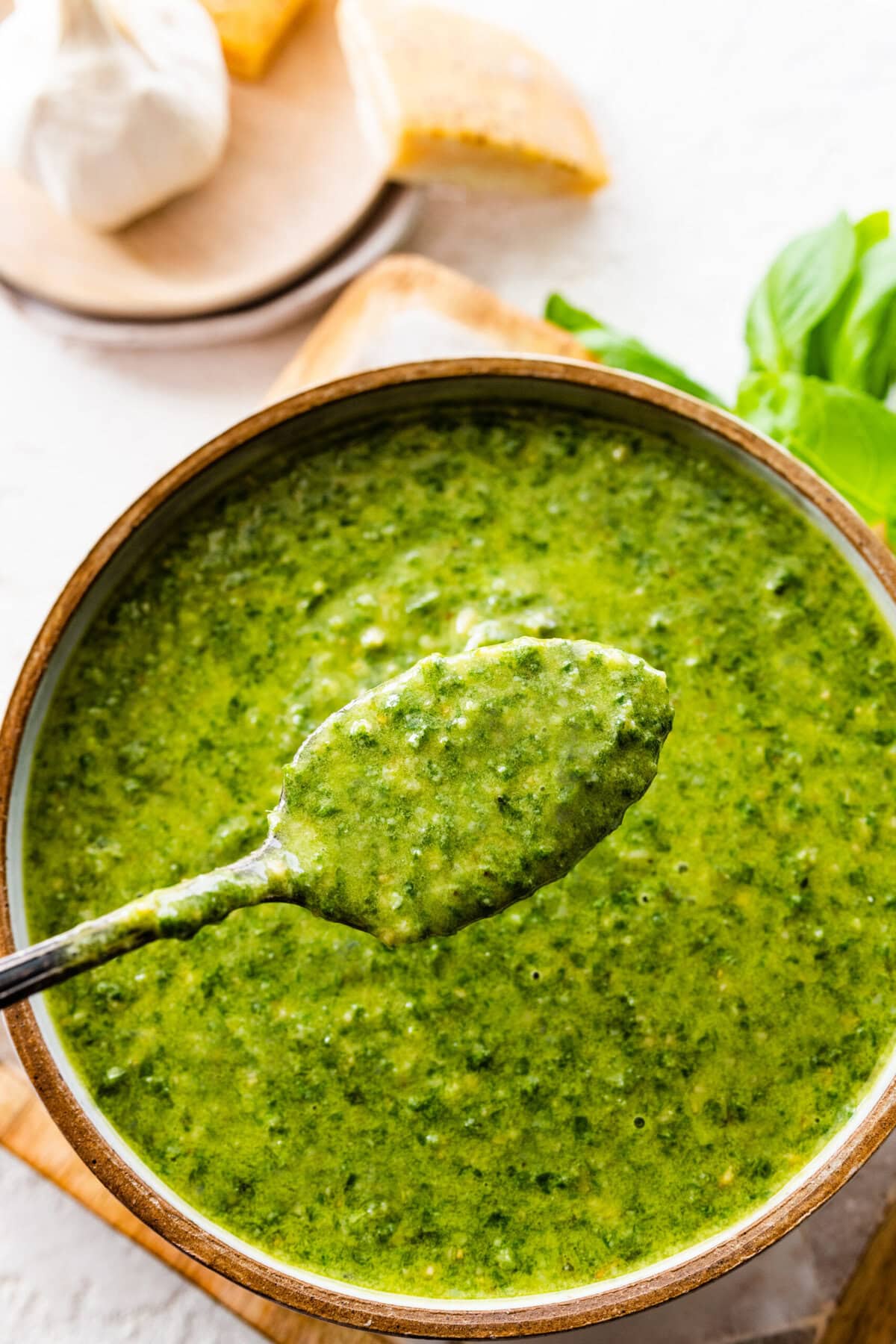

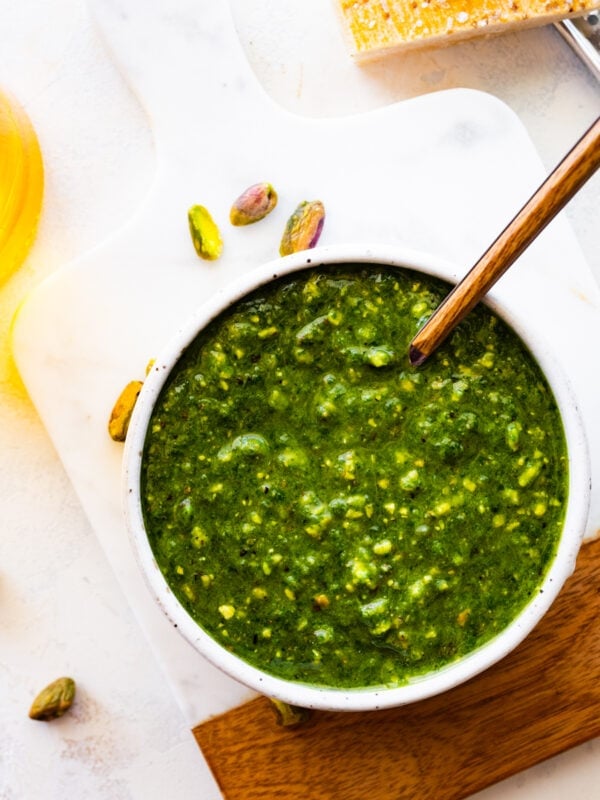

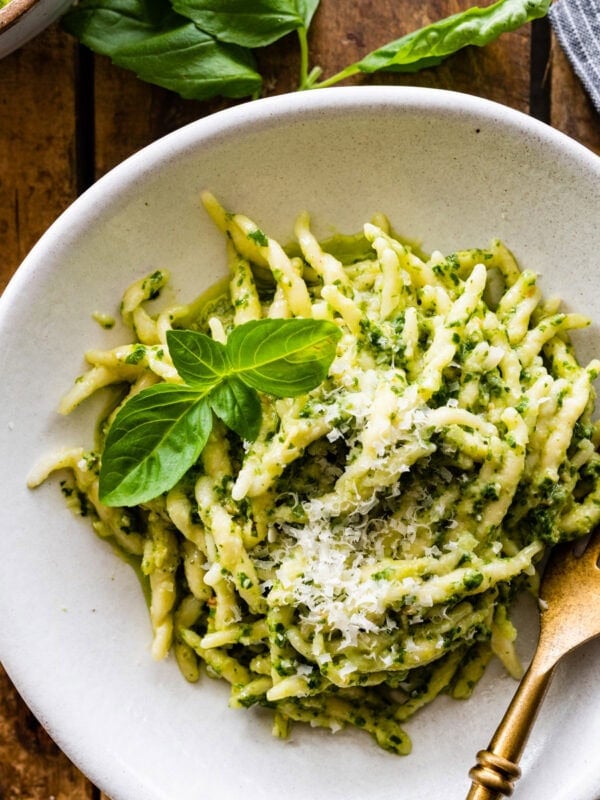




The best I ever made.
I am happy you loved it!
This is the best pesto recipe I have made!! I made some and froze in cubes to use up the basil in my garden.
Yes! Freezing is a great idea. It’s great to use in soups and pasta and more.
Excellent tips to get the best results in this traditional recipe.
Thank you! I am happy they were helpful. We adore this pesto!
This is a really good recipe, just wait till all the flavors meld together!
Yes! It is easy and delicious on and with so many things.
i tried the pesto recipe and it was simple delicious! so fresh!
It is a tried and true recipe. Happy you enjoy the pesto recipe.
Hi Elena, terrific tip on freezing the food processor blade! Never thought of that and I’ve made pesto so many time. Will try that. I use only Parmesan not the pecorino, but may have to try that too! I love to stir it into risotto, my fave dish in the world i make often. Who could live without pesto?
Hi Sally, so happy you loved the tips and recipe. I agree- pesto on everything!
This pesto sauce is so good!!! This recipe was a lot easier than I thought it would be to make pesto!
Happy you love it! It is so easy to make!
So happy to hear that! I hope you can make it again.
Best and most authentic pesto recipe straight from Italia!
This is a staple in our house. We love this pesto! It’s so easy and so delicious and everyone loves it.